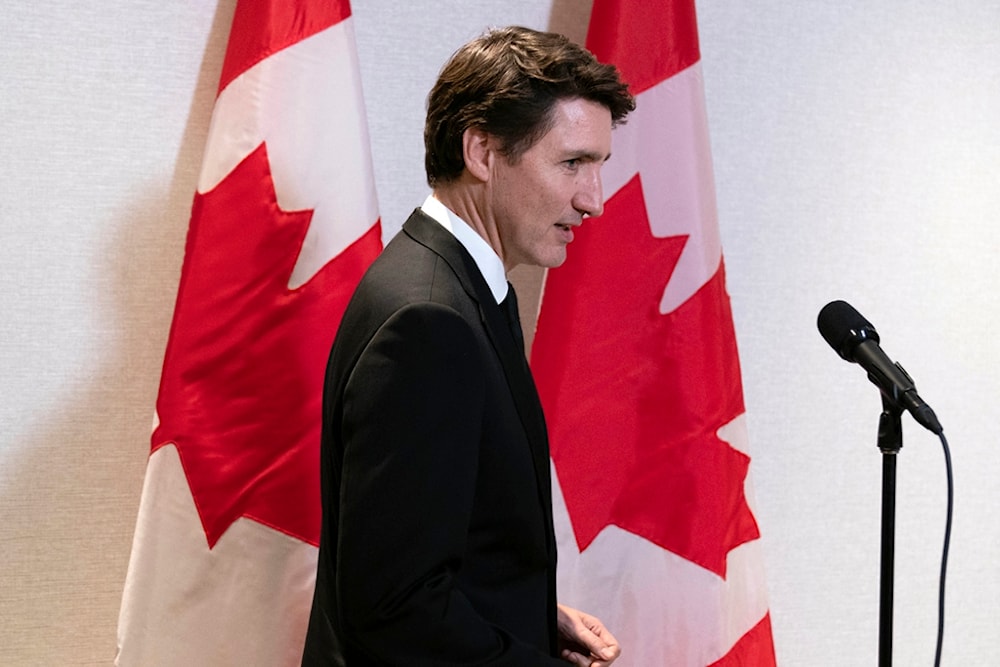Canada to challenge US tariffs at WTO amid 'trade war'
Canadian officials say their government will be filing a claim with the WTO against the United States for its tarrif hikes.
-

Canada's Prime Minister Justin Trudeau arrives to speak to the media after a meeting with the President and CEO of The National Association of Manufacturers Jay Timmons in Washington, Thursday, January 9, 2025. (AP)
Canada will file a complaint with the World Trade Organization (WTO) against tariffs imposed by US President Donald Trump and will also seek recourse under the US-Mexico-Canada Agreement (USMCA), a Canadian official said on Sunday.
"The Canadian government clearly considers these tariffs to be a violation of trade commitments that the United States has taken," the official, speaking on condition of anonymity, told reporters. The official cited both the WTO and the USMCA, which Trump himself signed in 2018, as avenues for legal action.
Meanwhile, Canadian Prime Minister Justin Trudeau took to X to call on Canadian citizens to boycott US products, substituting them with Canadian ones. "Now is the time to choose products made right here in Canada," he said. "Check the labels. Let’s do our part. Wherever we can, choose Canada."
Now is the time to choose products made right here in Canada.
— Justin Trudeau (@JustinTrudeau) February 2, 2025
Check the labels. Let’s do our part. Wherever we can, choose Canada.
The trade dispute comes as Trump escalated tensions by suggesting once again that Canada should become a US state. In a statement on his Truth Social platform, Trump claimed the United States "subsidizes" Canada through its trade deficit and argued that without this support, Canada would "cease to exist as a viable country."
"Therefore, Canada should become our Cherished 51st State," Trump wrote, asserting that such a move would result in "much lower taxes, far better military protection for the people of Canada—AND NO TARIFFS!"
Major tariffs hikes
Trump imposed new tariffs on major trading partners—Canada, Mexico, and China—on Saturday.
The tariffs include a 25% levy on most exports from Canada and Mexico, and an additional 10% on Chinese goods, on top of existing duties. This move, justified by claims of a national emergency linked to illegal immigration and fentanyl trafficking, threatens significant disruptions in industries ranging from agriculture to automotive manufacturing and energy. The tariffs are also expected to increase costs for US consumers and businesses.
Canada and Mexico are major suppliers of agricultural products, and the auto industry is heavily reliant on these countries, with 70% of light vehicles built in North America destined for the US. The tariffs could drive up vehicle prices, damage supply chains, and result in job losses. Experts warn that the resulting inflation could slow consumer spending and business investment, undermining Trump's economic rhetoric of deregulation and tax cuts.
One of the most significant consequences is the impact on US energy markets. Nearly 60% of US. crude oil imports come from Canada, and imposing tariffs on Canadian energy could raise prices, particularly in the Midwest, where oil refineries depend on these imports.
While Trump claims these tariffs will incentivize domestic energy production, they risk destabilizing the US energy market and exacerbating inflationary pressures. The recent US licensing of Chevron's operations in Venezuela may help alleviate energy shortages by boosting oil imports and offering relief amid tariff disruptions.
Read more: Trump reiterates BRICS tariff threat as critical deadlines loom

 3 Min Read
3 Min Read










